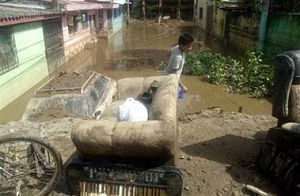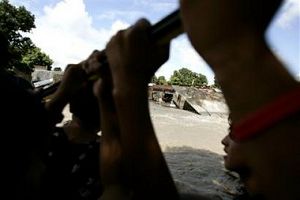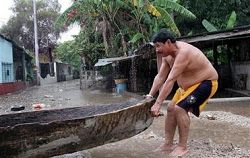Hurricane Stan News and Relief Efforts
 DISASTER AND DEATH IN THE WAKE OF HURRICANE STAN
DISASTER AND DEATH IN THE WAKE OF HURRICANE STAN
As of October 10, 652 people were confirmed dead, 1,400 reported missing, and hundreds of thousands left homeless in Guatemala as a result of the torrential rains and mudslides caused by Hurricane Stan. Forty-two others were killed in Mexico, 72 in El Salvador and 11 in Nicaragua. Many of the areas hardest hit were poor, rural, and indigenous communities where aid was slow in arriving. Even as survivors locate and rebury the dead, Guatemala is preparing for epidemics arising as a result of poor sanitation, malnutrition, and exposure, as well as a difficult recovery, with an estimated 1.8 million people affected and an estimated $400 million in crops lost.
More news follows this section.
 HOW YOU CAN HELP:
HOW YOU CAN HELP:
The following organizations are providing direct aid to Guatemalan survivors.
1)Archbishop's Office on Human Rights (ODHAG)
GHRC / USA is collecting donations to send to the ODHAG, who will then distribute the funds through their parishes to communities affected by the hurricane. Specifically, they are collecting funds for water, food, medicine, and blankets.
TAX-DEDUCTIBLE DONATIONS:
• Send checks made out to GHRC-USA with "Hurricane Stan Relief" written in the memo line to: GHRC / USA, 3321 12th St. NE, Washington, DC 20017
• Call (202) 529-6599 for more information or to donate by credit card.
2) Rights Action
 Rights Action is channeling funds directly to Guatemalan grassroots organizations working urgently in the most affected regions. In due course, Rights Action will properly account for all funds received. For more information: 416-654-2074, info
Rights Action is channeling funds directly to Guatemalan grassroots organizations working urgently in the most affected regions. In due course, Rights Action will properly account for all funds received. For more information: 416-654-2074, info rightsaction.org, www.rightsaction.org.
rightsaction.org, www.rightsaction.org.
TAX-CHARITABLE DONATIONS (in the USA and Canada)
• Credit Card Donations: www.rightsaction.org
• Make checks to "Rights Action" (write "Hurricane Stan Emergency Fund" on memo-line) and mail to:
• UNITED STATES: Rights Action, Box 50887, Washington DC, 20091-0887
• CANADA: Rights Action, 509 St. Clair Av. W., box73527, Toronto ON, M6C-1C0
3) Pueblo a Pueblo
Pueblo a Pueblo is an organization based in Santiago de Atitlan that is collecting donations and supplies to benefit one of the areas hardest hit by the hurricane. For more information: pueblo pueblo.org, www.puebloapueblo.org
pueblo.org, www.puebloapueblo.org
************************************************************************
NEWS ARTICLES
1,400 GUATEMALANS MISSING; 618 CONFIRMED DEAD
Agence France Presse / Sunday October 9, 2005
A frantic search for about 1,400 people believed to be buried alive by a mudslide in Guatemala was continuing as the death toll from massive floods throughout Central America and Mexico rose to a staggering 618. The towns of Panabaj and Tzanchaj, 180 kilometers (110 miles) west of Guatemala City, were hit by the mudslide triggered by rain from Tropical Storm Stan before dawn Wednesday, when soil loosened by days of driving rain began rushing down the slopes of the San Lucas volcano.
"I don't believe there are survivors. Already 36 hours have passed. According to estimates we have, 1,400 people were trapped there," Mario Cruz, a firefighters' spokesman, told AFP on Sunday. If those fears are confirmed, Guatemala's death toll could soar close to 2,000. The official count stood at 508 Saturday, up from 176 a day earlier after rescue workers discovered hundreds more bodies. Many of the victims were indigenous people who lived along the banks of Lake Atitlan, in the west of the country. Tonnes of soil poured down the sides of the mountains surrounding the lake. Most roads to the isolated area were impassable, and helicopter flights were hampered by driving rain falling for an eighth day onto waterlogged ground.
Guatemalan President Oscar Berger made an impassioned plea to the diplomatic corps in his country's capital late Friday for international assistance, estimating agricultural losses at 135 million dollars. But he did not hold out much hope to his compatriots. "I believe we are in for more unpleasant surprises," Berger said. "Many people remain missing. There have been many mudslides, and many communities remain cut off."
The United States, Japan, Mexico, Spain, Cuba, Canada and the Central American Bank for Economic Integration pledged help. Norway's Ambassador Rolf Berg requested a detailed needs assessment to best help the estimated 1.8 million Guatemalans affected by the storm.
GUATEMALA BLAMED FOR SLOW AID TO MUDSLIDE VILLAGE
By Frank Jack Daniel / Sunday October 9, 2005
PANABAJ, Guatemala (Reuters) - Aid trickled into a Guatemalan village devastated by a mudslide that killed some 1,400 people, and Maya Indian residents complained on Sunday the government was far too slow to react to the tragedy. Peasants from neighboring villages brought coats and clothing for the victims, rowing canoes across Lake Atitlan to Panabaj. The town was buried under a deadly slick of mud, rocks and trees that slid down a volcano after heavy rains from Hurricane Stan. Spanish firemen arrived to look for bodies under a quagmire that is up to 40 feet deep in places and Guatemalan soldiers brought water in a truck.
But government help was little and late, local officials said. They were angry that President Oscar Berger had not visited the village four days after one of Latin America's biggest tragedies of recent years struck. "I feel totally sad, morale is very low. We want to see the president, we want to see him here," said Diego Esquina, mayor of Santiago Atitlan municipality, which runs Panabaj. Stan's rains triggered the mudslide as Panabaj's residents slept early on Wednesday.
No senior government official went to the village and the mayor said racism against the Mayas might be to blame for their lack of interest. "It's like they are giving a message that it is because we are indigenous. That is the point. A lot of my people are saying it is because we are indigenous," Esquina said.
Santiago Atitlan was a hot spot during Guatemala's 36-year civil war, which ended in 1996. Years of abuses by soldiers helped leftist rebels recruit Indians in the town and tensions peaked in 1990 when drunken soldiers killed 13 locals.
A supply of beans, rice and pasta sent by the capital's city hall was handed out on Sunday but peasants said the federal government was negligent. "The government didn't send anything here. There is nothing," said Francisco Boron, 43, dressed in traditional calf-length white pants and carrying a machete. Rescuers with hand tools struggled to find bodies in the brown grunge covering Panabaj, and local officials said it would likely be left as a mass grave.
The fire department put the death toll at around 1,400 villagers and Esquina said between 1,000 and 1,500 had died. The storm killed some 300 people elsewhere in Guatemala and 103 others in the rest of Central America and southern Mexico. Guatemalan newspaper reports said several hundred people died at another landslide in the department of San Marcos near the Mexican border and some 2,000 were missing, but that could not be confirmed.
Defense Minister Carlos Aldana told Reuters the armed forces were trying to reach the stricken area. "San Marcos is the place where, from today, we are giving most importance because it has not been dealt with at all due to the weather conditions and the road access." he said. Around half a dozen light airplanes used by the army tried to fly to San Marcos on Sunday with food supplies but had to turn back 30 miles away at the town of Retalhuleu because of thick cloud in the mountains. Oliver Piedrasanta, 27, a fireman in that town, said whole neighborhoods in San Marcos had been buried by mud.
Guatemala Human Rights Commission- USA
GHRC-USA
3321 12th St, NE
Washington, DC 20017
202-529-6599
202-526-4611 fax
ghrc-usa ghrc-usa.org
ghrc-usa.org
www.ghrc-usa.org